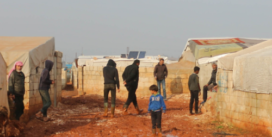- Fall Newsletter, 2025, Issue 15
- Using International Online Learning Modules to Engage Students in the Study of Critical Global Issues
- Upcoming Book Launch: Hearts of Freedom
- Announcing winners of the 2025 CARFMS Essay Contest
- The New York Declaration for Refugees and Migrants and its two Global Compacts: Addressing the Symptoms or the “Root Causes” of Forced Displacement?*
Call for Papers
CALL FOR PAPERS: RESTRUCTURING REFUGE AND SETTLEMENT: RESPONDING TO THE GLOBAL DYNAMICS OF DISPLACEMENT
Conference organized by
The Canadian Association for Refugee and Forced Migration Studies (CARFMS)
Hosted by
Centre for Refugee Studies (CRS)
York University, Toronto, Ontario, Canada
May 16-18, 2012
Globalization has transformed traditional patterns of human mobility. Demographic, economic, social, political and environmental developments accelerate the pace of change. States pursue increasingly selective policies with a view to maximizing economic benefits of immigration. They tend to favour not only highly skilled migrants, but also a highly flexible work force. In recent years, the number of temporary foreign workers admitted to Canada has more than doubled. A similar trend can be observed in other countries. Different legal and administrative categories of temporary migrants emerge with different rights and entitlements. Some of them, especially circular, domestic and seasonal temporary workers occupy low-wage, low-status jobs with poor labour standards and are more likely to suffer discrimination in respect to employment. Low-skilled temporary migrants often have restricted access to citizenship in the host country and are at risk of falling into irregular status. The precarious situation in which many migrants and their family members find themselves is challenging for settlement policies. There is an urgent need to restructure these policies and to promote comprehensive integration programmes in order to prevent legal, economic and social marginalization of migrants. Refuge is another area which is deeply affected by the global dynamics of displacement. In the current context of economic uncertainty, concerns about terrorism and security, and tightened border controls, the condition of IDPs, stateless persons, irregular migrants, asylum-seekers and refugees deteriorates. Their access to protection is restricted. The strengthening of State control over forced migrants through harsher immigration measures transforms the logic of domestic structures and public policies. It lowers protection standards and increases the vulnerability of forced migrants.
The 2012 CARFMS Conference will bring together researchers, policymakers, displaced persons and advocates from diverse disciplinary and regional backgrounds to discuss the issue of restructuring refuge and settlement with a view to better understanding how migration policies, processes and structures responds to the global dynamics of displacement. We invite participants from a wide range of perspectives to explore the practical, experiential, policy-oriented, legal and theoretical questions raised by refuge and settlement at the local, national, regional and international levels. The conference will feature keynote and plenary speeches from leaders in the field, and we welcome proposals for individual papers and organized panels structured around the following broad subthemes:
Restructuring settlement: Local, national, comparative and international issues and concerns
States’ utilitarian approach towards migration challenges the balance between the objective of economic development, on the one hand, and integration and equal treatment of migrants, on the other. Recent changes in the selection of migrant workers have negative consequences on social cohesion. Settlement, adaptation and integration policies play an important role at local, national and international levels to address this situation and prevent exclusion: What are the strengths and the weaknesses of settlement policies? How should these policies be adapted to meet the needs of increasing numbers of temporary workers? How can actors promote a process of integration that fosters social cohesion? What is the role played by local and national authorities, employers and members of civil society? How to ensure coherence and coordination between various actors dealing with issues such as health, education, social welfare, employment and law enforcement? What are particular legal, social, economic needs of different groups of migrants? How does gender, age, ability, race and other factors affect settlement? What are the best settlement practices?
Restructuring refuge: Local, national, comparative and international issues and concerns
The recent reform of the Canadian asylum system aims at accelerating the refugee status determination process and reducing the number of asylum claims by making the system less attractive. In North America, the United States and Canada cooperate to stem “unwanted” migration. Similar developments can be observed in other parts of the world. Critical analysis of recent trends and developments contributes to a better understanding of current challenges: How do local, regional and international mechanisms and logics transform political and media discourse, norms, policies and practices related to forced migrants? What are the changes in institutional and procedural arrangements to deal with refugee and asylum claims? How do these changes affect protection norms and policies at the local, national and international level? How do international and local actors, institutions and agencies promote the legal, economic and social inclusion of forced migrants?
Restructuring settlement and refuge: New approaches and theories
Innovative approaches and theories developed within traditional disciplines or in interdisciplinary lines foster knowledge on current norms, policies and practices linked to questions of settlement and refuge. New theoretical, conceptual, methodological issues from diverse critical and institutional perspectives highlight these questions, including: the link between refuge and security in an era of globalization; the impact of restrictive regulation of the freedom of movement of forced migrants; the need to redefine policies of resettlement, adaptation, and integration of immigrants and refugees in a context of changing migration figures; the adaptation of settlement policies to promote social inclusion of low-skilled temporary workers, asylum seekers and irregular migrants; settlement and citizenship.
SUBMISSION OF ABSTRACTS
Individuals wishing to present a paper at the conference must submit a 250-word abstract and 100-word biography by December 30, 2011. The conference organizers welcome submissions of both individual papers and proposals for panels.
For more information, please contact Michele Millard at mmillard@yorku.ca
